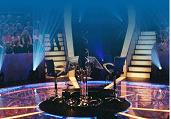TV
Who Wants to Be a Millionaire? producers wait for final answer on $270m battle with Disney
 A California jury is pondering its final answer in a six-year $270m (£178m) court wrangle brought by the British TV production company Celador, which claims it was short-changed by Disney out of a fair share of profits from the US version of Who Wants to Be a Millionaire?.
A California jury is pondering its final answer in a six-year $270m (£178m) court wrangle brought by the British TV production company Celador, which claims it was short-changed by Disney out of a fair share of profits from the US version of Who Wants to Be a Millionaire?.
Celador's chairman, Paul Smith, brought the gameshow to British television screens in 1998, creating a phenomenon that quickly spawned versions around the world. Celador says Disney's ABC network, which produced the show in the US, has failed to stump up appropriate royalties.
Over three weeks, Disney executives including its chief executive, Robert Iger, have taken the stand at a courtroom in Riverside, east of Los Angeles, to explain the financial machinations behind the show's success. Judge Virginia Phillips has ordered lawyers to stay within 10 minutes of the court in case of a swift outcome.
In a battle widely portrayed as a David against Goliath encounter, Celador argues that it was entitled to 50% of profits from any revenue made through exploiting the programme, which at one stage ran five nights a week on ABC's coast-to-coast network. Celador claims Disney blurred the show's profitability through a series of "sweetheart" deals shuffling money between subsidiaries, and the two sides are arguing over merchandising revenue.
Jurors were read emails sent by Disney's former boss Michael Eisner, who described the show as "quite awesome" and told colleagues: "This kind of thing happens maybe once a decade."
The show helped ABC climb to the top of the US television ratings, but Celador maintains that its reimbursements were modest. Disney's lawyers say the British firm got $19.2m in production fees.
Hosted in Britain by Chris Tarrant, the show was initially fronted in America by a veteran gameshow personality, Regis Philbin, and now by a daytime TV star, Meredith Vieira.
The show, in which contestants answer increasingly tough general knowledge questions for cash prizes, has been the subject of several courtroom battles. In 2003, a former army major, Charles Ingram, was convicted for cheating his way to a £1m prize with an accomplice coughing from the audience to indicate answers.
(Published by The Guardian - July 6, 2010)